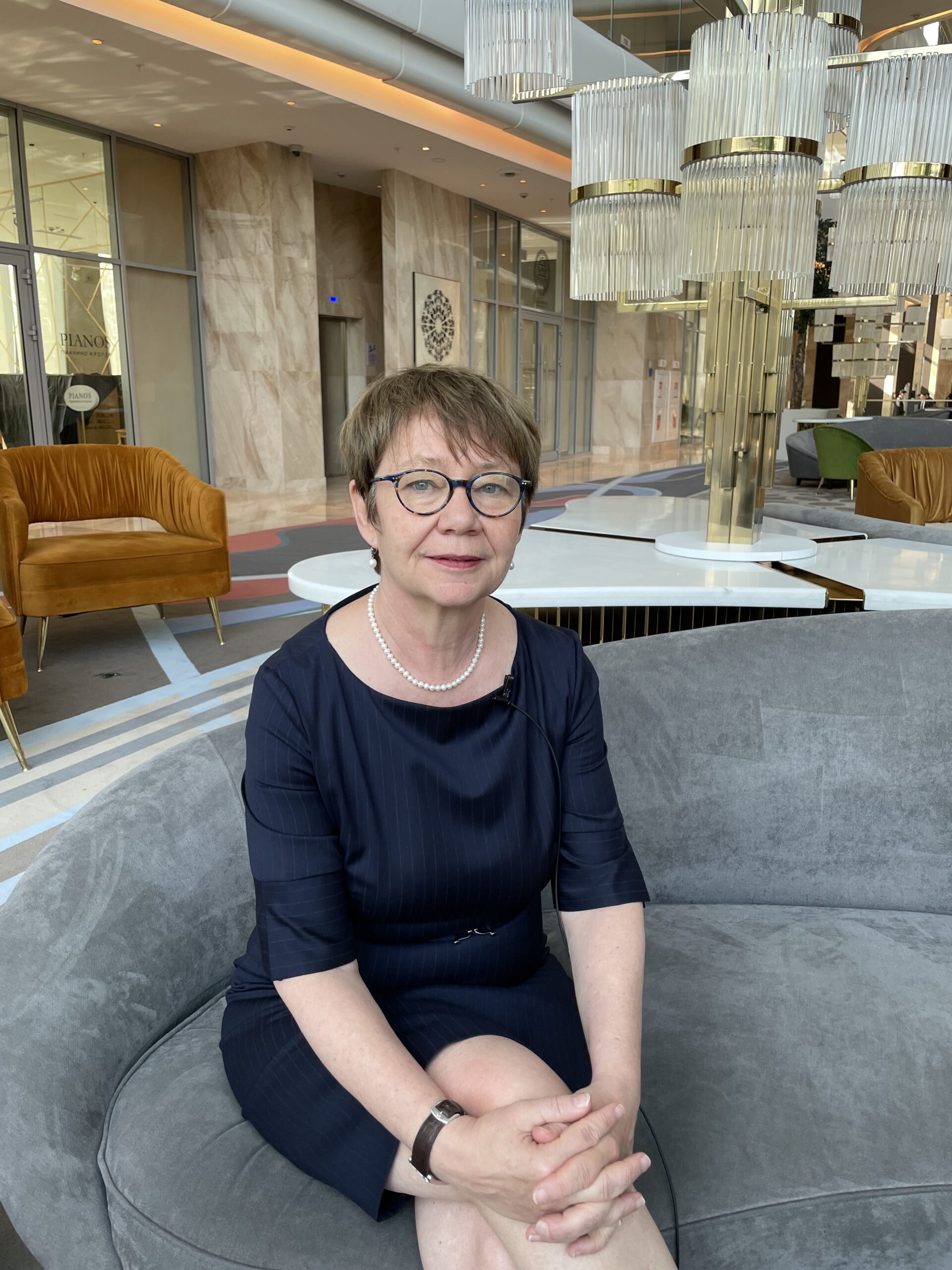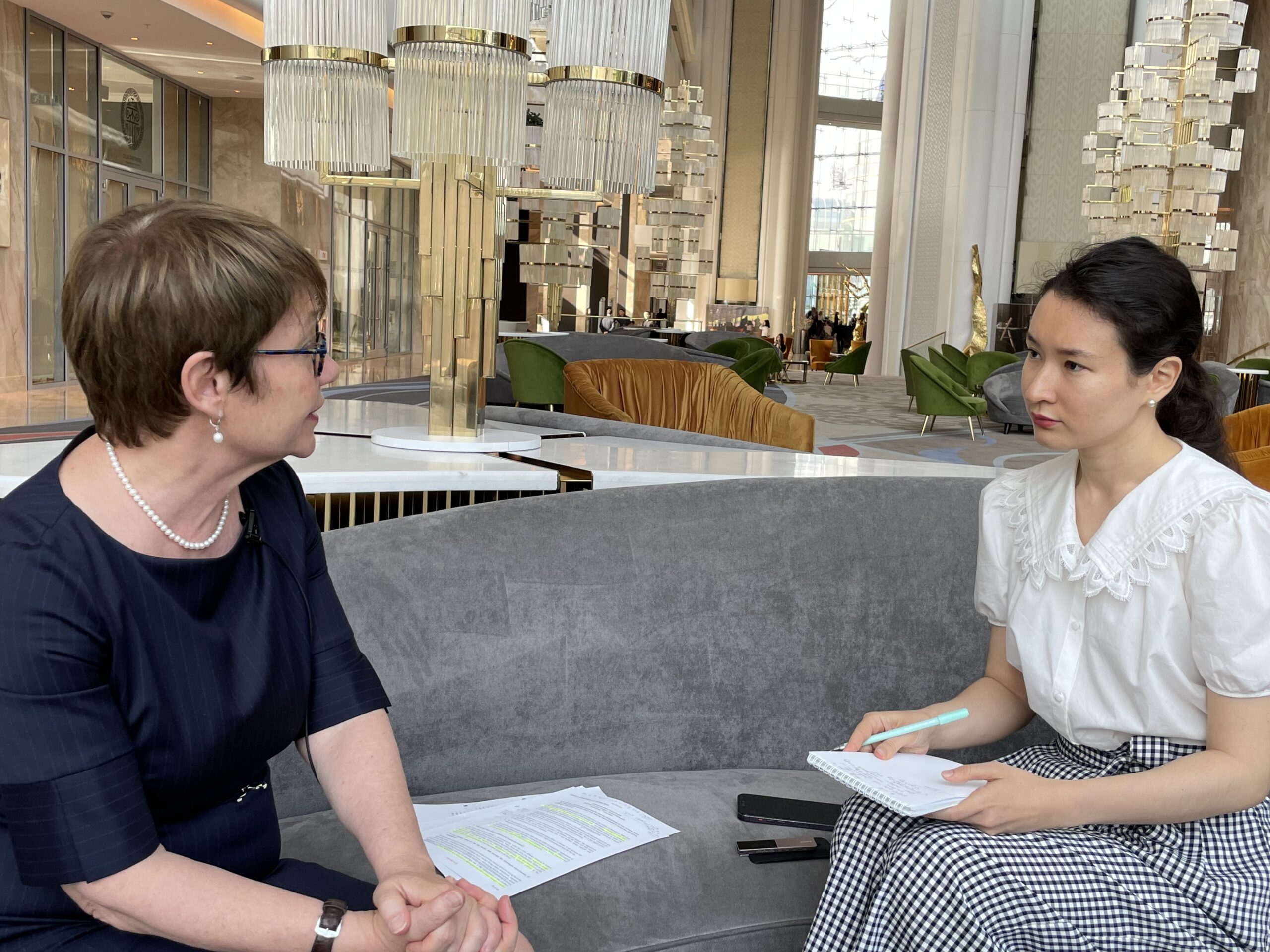ASTANA – The European Bank for Reconstruction and Development (EBRD) will support Kazakhstan, recognizing its significant capacity to develop renewable energy and increase transit potential through Middle Corridor, in line with the institution’s strategic plan, said the EBRD President Odile Renaud-Basso in an exclusive interview with The Astana Times on the sidelines of the Astana International Forum (AIF) on June 9.

EBRD President Odile Renaud-Basso. Photo credit: Nargiz Raimbekova/The Astana Times.
Renaud-Basso reflected on the past years of cooperation, highlighted ongoing projects and expressed enthusiasm for expansion in the renewable energy and transit infrastructure development projects, as well as women’s greater representation in business.
Since the EBRD started investing in Kazakhstan over 30 years ago, it has provided over 10 billion euro ($US10.7 billion) in financing through more than 300 projects across the country.
“Our relationship with Kazakhstan is about partnership, which has a very different meaning in today’s world shaken by various geopolitical adversities. Today, more than ever, you need long-term reliable partners, which can support your most ambitious plans both financially and intellectually,” said Renaud-Basso.
The EBRD is Kazakhstan’s leading partner in private sector investment, committing to it 60% of its total finance, with the remaining 40% invested in the public sector.
“We are cooperating in different areas from decarbonization of the national power sector to small and medium-sized enterprises (SME) support, from digitalization and green economy projects to the improvement of regional connectivity. These particular projects contribute to better connectivity of the country with other regions, promote trade and decarbonization, introduce better ecological standards and make Kazakhstan’s cities greener,” she said.
The EBRD exhibits a profound interest in the Central Asian region, as evidenced by its extensive portfolio of projects spanning multiple domains.
“Central Asia is a very important region for the EBRD,” said Renaud-Basso. “Since the beginning of operations, the bank has invested over 18.1 billion euro ($US 19.5 billion) through more than 1,000 projects. Last year alone we invested $1.5 billion here. Sixty-six percent of these projects were green,” she said.
Renewables and electricity
Last year, the EBRD approved a new five-year strategy for Kazakhstan based on three pillars: fostering private sector competitiveness and connectivity, supporting Kazakhstan’s green pathway to carbon neutrality and climate resilience, and promoting economic inclusion and gender equality through private sector engagement.

Renaud-Basso spoke to The Astana Times correspondent Aibarshyn Akhmetkali on EBRD’s ongoing projects and priority field for cooperation with Kazakhstan. Photo credit: Nargiz Raimbekova/The Astana Times.
According to Renaud-Basso, Kazakhstan has a significant potential for the development of renewable energy, particularly from wind and small hydropower plants, as it has set an ambitious goal of reaching carbon neutrality by 2060.
The EBRD will provide green finance supporting the decarbonization of the country’s economy and focus on climate-oriented investment, she said.
“Green transition will be a sector that will grow in terms of investment in the country, which is still 70% reliant on coal. We see the ambition in the development of renewable capacity is increasing so this I believe will definitely be an area where we will invest more, hopefully,” said Renaud-Basso.
“With that comes also investment in the electricity network, the grid, because to have more renewable, you need to have a strengthened electricity network, and we are working on this,” she added.
There are also plans to invest in the development of gas as a balancing energy for renewable.
“We are working with a gas company to enhance the compression capacity in order to be able to use the gas as a balancing factor in the energy mix with renewables,” said Renaud-Basso.
The country also has vast mineral resources and substantial economic potential to develop critical raw materials such as rare earth metals, she added.
The EBRD has previously provided financial support for projects such as the 100-megawatt Saran solar photovoltaic power plant in the Karagandy Region and M-KAT Green, a 100-megawatt solar power plant in the Zhambyl region of southern Kazakhstan.
Current EBRD projects
The EBRD is funding the Almaty ring road construction and the Almaty International Airport infrastructure development projects, as well as the project aimed to modernize the combined heat and power plant in Almaty, to name a few.
The Almaty ring road, also known as BAKAD (Big Almaty Ring Road), is a 66-kilometer half-ring road around the city that will remove a major transport bottleneck and increase the transit throughput capacity boosting international trade while reducing local air pollution.
It is the largest public-private partnership (PPP) project in both Kazakhstan and Central Asia, said Renaud-Basso. It will be launched in mid-June.
Another project is the development of key infrastructure at the Almaty International Airport.
“The biggest-ever private investment in airport infrastructure in Kazakhstan and the region will help boost operations of the busiest airport in Central Asia. It will facilitate better regional and international connectivity for air travelers,” said Renaud-Basso.
The EBRD has also advanced the modernization of the Combined Heat and Power Plant 2 in Almaty. The project shows sustainable development in action, facilitating the full replacement of coal with natural gas and providing a major environmental relief for the city.
“This is part of the new green transition. It will dramatically reduce the emission of gas and air pollution, which is a big problem in Almaty. It will reduce emissions by more than 50%,” said Renaud-Basso.
“No other financial institution has done more than the EBRD to support the replacement of municipal public transport and upgrades of municipal utilities in Kazakhstan,” said Renaud-Basso referring to the EBRD’s Green Cities program, which has been implemented in 11 cities in Kazakhstan.
Four cities, including Almaty, Semei, Shymkent and Ust-Kamenogorsk, joined the EBRD Green Cities program.
“We’ve seen our project accompany the transformation of the country and we are very proud of that. We are willing to do more to support the diversification of the economy, bringing new foreign investors,” said Renaud-Basso.
Middle corridor
The development of connectivity routes from Central Asia to Europe and diversifying transit corridors is another area of focus for the EBRD.
“In the light of the ongoing geopolitical turmoil, we see the reinvigoration of the Trans-Caspian route through Kazakhstan both as a regional economic zone and as an increasingly important alternative route between Europe and China,” said Renaud-Basso.
“We have an infrastructure project under preparation already to facilitate connectivity between Kazakhstan and Europe for transportation of goods. Because of the current new geopolitical context, there is an absolute need to diversify and to develop this connectivity,” she added.
Last month, the EBRD presented a comprehensive study on sustainable transport connections between Central Asia and Europe, which identified the infrastructure investment needs and soft connectivity measures to the operational efficiency of the Central Trans-Caspian Network (CTCN), traversing through southern Kazakhstan.
“We’ve been doing a very important study on connectivity between the European Union (EU) and Central Asia looking at all the options, and the Middle Corridor is a very important one. So we continue to work on that,” said Renaud-Basso.
The EBRD’s support for women and youth
Advancing gender equality and women’s empowerment in business is also among the top priorities of the EBRD.
“We want to enhance our activity in support of inclusion, and in particular, women in business. So we started a program with the banks in 2016, to have a dedicated credit line for women and we are going to continue and deepen that,” said Renaud-Basso, referring to the Women in Business program launched to promote women’s participation in business through access to finance and business advice to help businesses become more competitive.
Since 2016, the EBRD has also facilitated dialogue between the private sector and the Kazakh government to reduce the number of jobs women were barred from under the outdated labor code.
“We worked a lot with the government in order to support a law that was passed last year, which removed all the barriers for the profession that were forbidden for women to access,” said Renaud-Basso.
The EBRD has helped Kazakhstan to remove gender restrictions in nearly 300 occupations originally implemented during the Soviet era to protect women from hazardous tasks, but which hindered women from accessing numerous stable and well-remunerated professions.
“We are strong supporters of inclusion in the economy, particularly women inclusion and this was big. The impact will take time because it’s also a societal challenge but I think it was an important step towards gender equality and inclusion,” said Renaud-Basso.
The EBRD has also developed a similar program for young entrepreneurs, Central Asia Youth in Business Program, which is expected to start in September/October this year. It aims to promote youth entrepreneurship by improving young entrepreneurs’ and managers’ access to finance and know-how and to promote a dynamic youth entrepreneurship ecosystem in the region.
Participation at Foreign Investors Council and the AIF
Renaud-Basso spoke at the 35th plenary session of the Foreign Investors Council (FIC), which coincided with the AIF on June 8. FIC, which celebrated its 25 years anniversary, was established as an advisory body to promote direct dialogue between the Kazakh government and foreign investors.
“The EBRD was one of the founding members of Kazakhstan’s Foreign Investors Council and our commitment to Kazakhstan remains as firm as ever,” said Renaud-Basso.
“We’ve been there since the beginning and we believe it has proven its usefulness. What is absolutely key is frank dialogue and the capacity to find solutions to issues such as tax, governance, window to the regulatory framework for the business sector, and so forth,” she added.
Sharing her impressions from the participation at the AIF, she called the event a “big success.”
“I think being able to bring together people for dialogue and to make a change and also to attract foreign investors to Central Asia to better understand the situation of the region, the opportunities is also very important,” she Renaud-Basso.
“Before it used to be an economic forum. I think now to have a broader set of issues, including geopolitical [issues] is very relevant at the current juncture,” she added.
